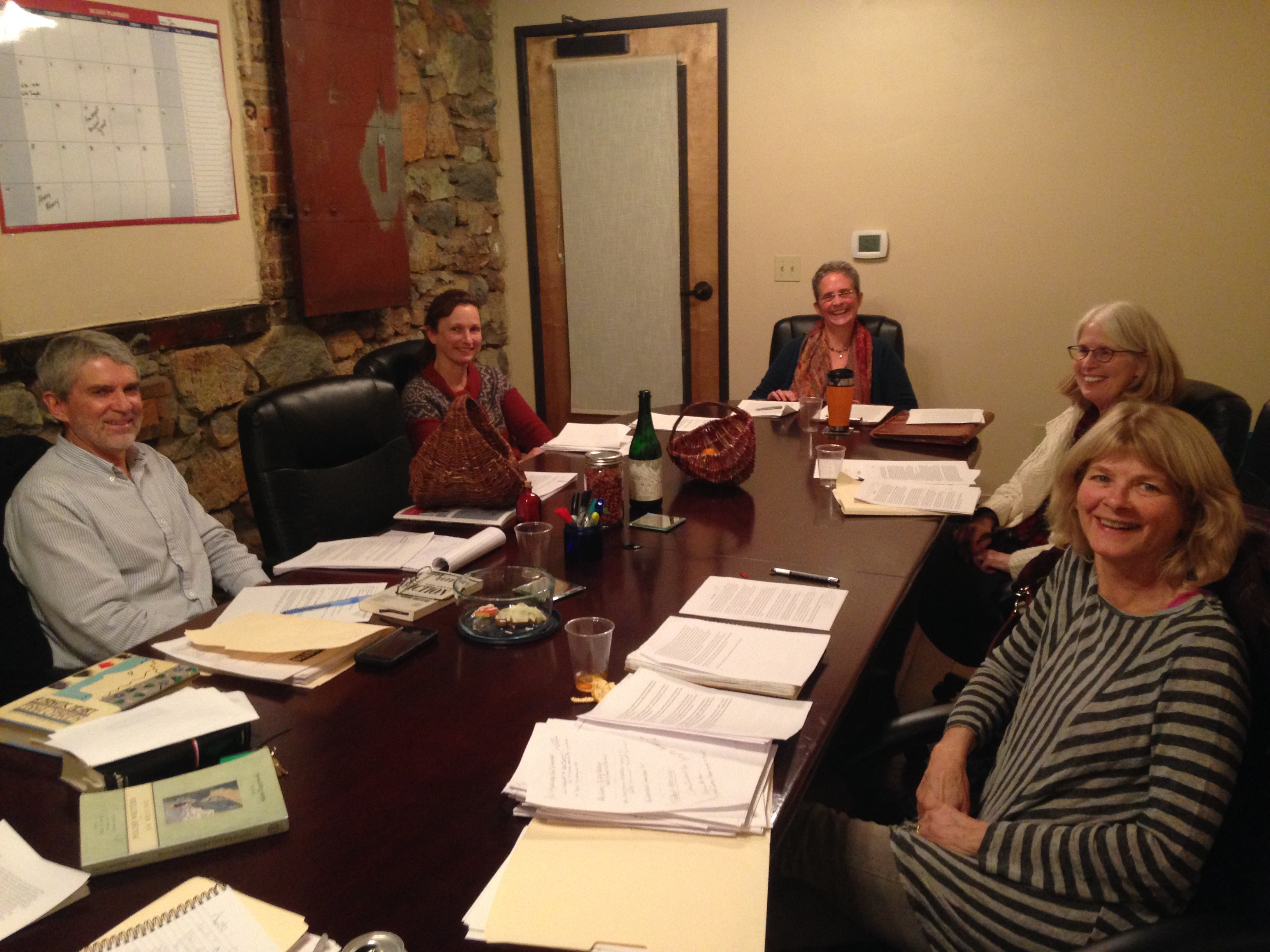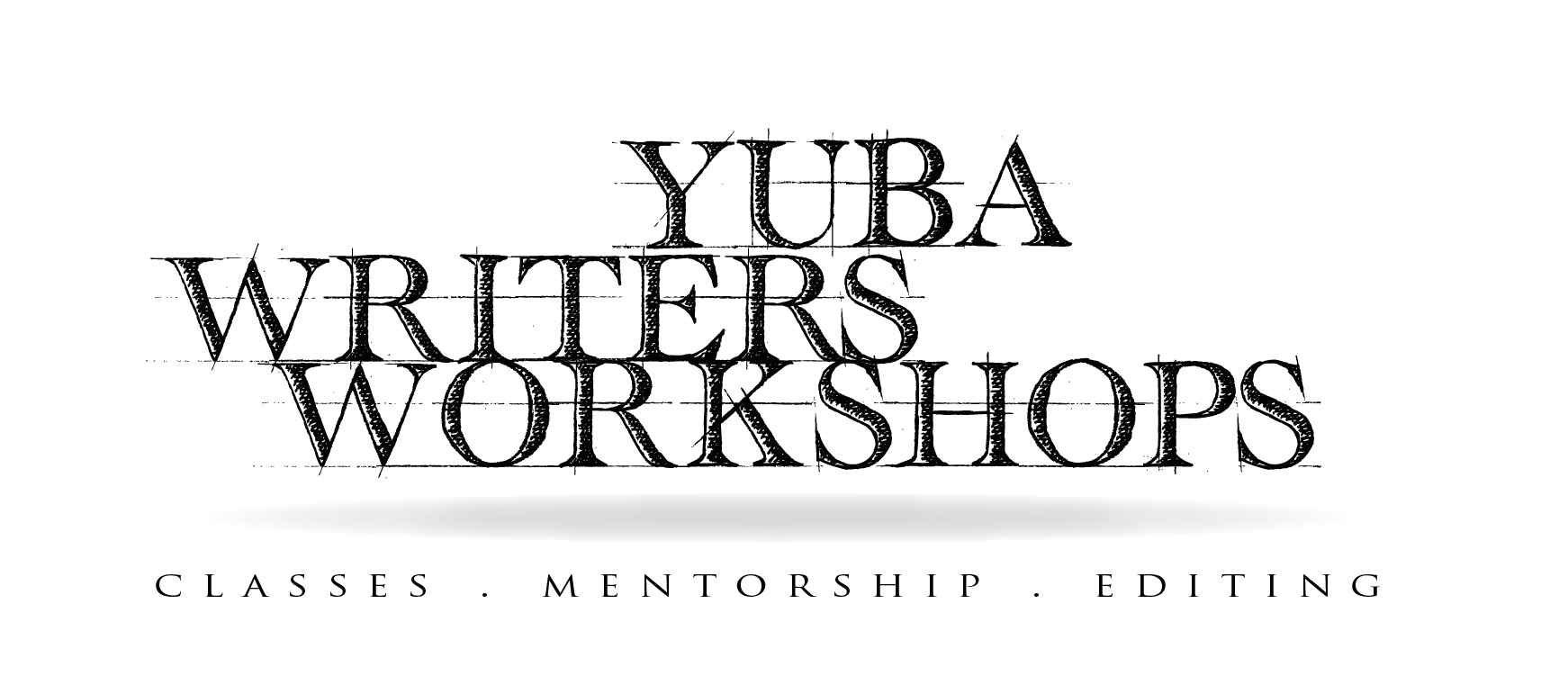For three years I taught in-person classes in Grass Valley. These classes ended with the coronavirus pandemic and my 2023 move to Davis, California. Past classes are described below. I am grateful for the thoughtful, kind, and insightful students I worked with in Nevada County.
–Get started writing.
–Or get serious about it.
Multi-week and one-day classes in fiction and nonfiction, taught by a New York Times-acclaimed memoirist and top-rated Stanford Continuing Studies instructor.
All classes at the Alpha Building, 204 Main St. (at Mill), Grass Valley

Members of the pilot Take Your Writing to the Next Level class, fall 2017.
Winter 2019 Offerings:
For those who want to GET STARTED:
Life Into Literature: Explorations in Memoir
Six Monday nights in January and February: 6:30-9 p.m. January 27th, February 3rd and 10th, and February 24th, March 2nd and 9th.
You’ve lived a rich life. You want to share it in writing. Where does your story begin? Where does it end? How do you make your life a page-turner?
In these classes with New York Times acclaimed memoirist Rachel Howard, you’ll learn how to shape compelling, meaningful stories out of the mass of experience. Discussing carefully chosen memoir readings by Jo Ann Beard, Alexandra Fuller and others, and completing guided exercises, you’ll learn to write cinematic scenes, craft powerful reflections, identify your richest material, and shape a suspenseful narrative. Our class series includes weekly “homework” to keep you rolling, and ends with a supportive, in-depth workshop of one longer submission (up to 5,000 words). No writing experience necessary, though experienced writers will also benefit.
Enrollment limited to six students.
Course fee: $345
Contact Rachel at rachel.howard@gmail.com for registration information.
For those who want to GET SERIOUS:
Bringing Your Book Together: Large Manuscript Workshop for the Novel
Are you deep into writing a novel and tired of having it critiqued in 20-page snippets? Ready to get bigger-picture response to issues like structure and narrative arc, but not quite at the stage when you need a full manuscript review? This workshop is for writers at that rich but tricky middle stage when piecemeal feedback no longer cuts it.
In this class, limited to five committed students, writers will submit a long section of their novels-in-progress—between 75 and 100 pages–along with a projected book outline. Our first session will be dedicated to a comprehensive lecture on big-picture craft concepts for each genre: Setting up the story engine, interplay of scene and reflection, character development, lines of tension, finding the narrative “turn,” and more. In subsequent sessions, we’ll workshop your manuscripts, one writer per week, following a guided process. You’ll learn a wealth about novel fundamentals by critiquing fellow workshop members, and benefit from a thorough discussion of your own work. You’ll emerge with a clearer sense of your book as a whole, and clear steps for taking it towards completion.
The required textbooks are Wired for Story, by Lisa Cron and Beginnings, Middles, and Ends, by Nancy Kress.
Seven Wednesday afternoons, February through April: 3:30-5:30 p.m. February 5th and 19th, March 4th and 18th, April 1st, 22nd, and 29th.
Course fee: $635.
If you are interested, please email Rachel at rachel (dot) howard (at) gmail (dot) com.
Instructor Bio: Rachel Howard teaches creative writing primarily at Stanford Continuing Studies and the San Francisco Writers’ Grotto. She is the author of a memoir about her father’s unsolved murder, The Lost Night, which the New York Times praised as “enthralling.” Her novel, The Risk of Us, published by Houghton Mifflin Harcourt in April 2019, was described as “a simply gorgeous novel” that “illuminates the joys, challenges, fears, and frustrations of adopting a foster child” by the Associated Press. Her fiction and nonfiction has appeared in many publications, including the New York Times’ “Draft” series. She received an MFA in fiction from Warren Wilson College, and later served there as Interim Director of Undergraduate Creative Writing. She has also taught in the MFA program of Saint Mary’s College. She moved to Nevada City in 2014 and is founder and producer of the Yuba Lit reading series.
PAST CLASSES
SPECIAL NOTE: Yuba Writers’ Workshops often offers classes by popular demand. If you are interested in a class on a particular writing subject and can gather three or more writers who also desire that class, please email Rachel at rachel dot howard at gmail dot com to discuss the possibilities.
Novel Writing Foundation Workshop
There’s no formula to writing a novel. But there are fundamentals of “form and theory” you can master that will help you greatly along the way. In this deeply substantive and supportive class, for writers working on a novel or writers just beginning one, we’ll give your novel-in-progress a firm foundation. Our first four classes will explore your novel’s “implicit promise,” story engine, driving thematic question, character arc, and point of view, with in-class and between-class assignments to help you find your novel’s core. Our final four classes will combine craft instruction with in-depth workshop, with each participant receiving constructive, instructor-guided feedback on their novel’s first 5,000 words. We’ll talk equally about writing theory and writing practice, helping you establish your most productive habits. Most importantly: You’ll learn to read as a writer—with an eye for usable craft—so that you can mine your key models and keep your novel growing. You’ll learn to sidestep many pitfalls so that your novel writing experience can be richer, and your resulting novel far more engaging.
Textbooks: Beginnings, Middles, and Ends, by Nancy Kress. Less, by Andrew Sean Greer, one short novel TBA, and instructor handouts.
Cost: $565
Contact Rachel at rachel.howard@gmail.com for registration information.
Finding the Universal in the Particular
Whether you would like to write memoir, essay, short stories, or first-person reportage, all literary writing is rooted in a daily habit of noticing the “beloved particulars,” then digging inward to discover how those particulars can evoke what we might risk calling “the universal“–archetypal experience that almost any reader can relate to. In this welcoming, highly exploratory course, we will play with nonfiction forms ranging from the lyric to the narrative. Voice, point of view, structure, form—all of the essential, recurring terms of the writing life will be introduced as we discuss works by writers such as Tim O’Brien, Grace Paley, Joan Didion, and David Sedaris, and complete short twice-monthly assignments for feedback. Each student will also draft and workshop a longer piece of writing in our final month. But just as importantly, we will practice really seeing, being open and receptive, “sneaking under the fence of interpretation,” as Deborah Eisenberg calls it, and dropping defenses (especially the defenses we hide from ourselves) to find truths that can show us the transcendent in the particular. After all, as Flannery O’Connor wrote, “Wouldn’t it be better for you to discover a meaning in what you write than to impose one? Nothing you write will lack meaning because the meaning is in you.”
Cost: $565.
Contact Rachel at rachel.howard@gmail.com for registration information.
Better Than a Book Club: Reading Chekhov for Our Times
Why do so many writers read the stories of Anton Chekhov with near-religious devotion? Writing in late 19th century Russia, a contemporary of Tolstoy, Chekhov invented a new kind of story—the short story that explores irresolvable questions of human experience rather than delivering pat morals. His stories, which can be both hilarious and heartbreaking, cultivate compassion and an awareness of the bittersweet ironies of life’s continual passing. In this “better than a book club,” we’ll read a single Chekhov short story each month, paired with an insightful commentator by Chekhov admirers such as Francine Prose, Robert Hass, and Siddhartha Mukherjee. Discussion will be lead by Rachel Howard, novelist and writing teacher, but with a light touch allowing for all to contribute. You are welcome to attend each session separately, or sign up for all four for a discount. Tea and treats will be served. Please note, we will not hold a session in April. Let’s come together and see how Chekhov might give us the sustenance we need in compassion-challenged times.
Cost: These discussions of Chekhov are being offered as a community class by voluntary donation. Suggested donation: $15-25 per session.
One-Day Classes
For those who want to GET SERIOUS:
Paths to Publication: Navigating the Literary Landscape
Flexible scheduling, by demand
The paths to publication are many—but being a newcomer to the literary world can feel like groping through a dark, dense forest. This info-packed one-day class will give you a map of the publishing landscape. How do you place a short story with a literary journal? What do agents do? What’s a “platform” and why do publishers want you to have one? How is selling a nonfiction book different from selling a novel? How can residencies and conferences be helpful? What are the advantages and disadvantages of self-publishing or “hybrid” publishing?
We’ll answer these questions and many more, and spend hands-on time (online) exploring literary journals and their submissions systems. You’ll take home real examples of successful pitches, cover letters, and query letters, along with pointers on how to learn from rejection, work with constructive feedback, and keep forging your own publishing path.
Course fee: $95
If you would like to gather a group of five or more for this class, contact Rachel at rachel.howard@gmail.com.
*********************
Class description: Are you deep into writing a memoir and tired of having it critiqued in 20-page snippets? Ready to get bigger-picture response to issues like structure and narrative arc, but not quite at the stage when you need a full manuscript review? This is a memoir workshop for writers at that rich but tricky middle stage when piecemeal feedback no longer cuts it.
In this class, limited to three committed students, writers will submit a long section of their memoirs-in-progress—between 75 and 100 pages–along with a projected book outline. Our first session will be dedicated to a comprehensive lecture on big-picture craft concepts for memoir: Setting up the story engine, interplay of scene and reflection, character development, lines of tension, finding the narrative “turn,” and more. In subsequent sessions, we’ll workshop your manuscripts, one writer per week, following a guided process. You’ll learn a wealth about memoir by critiquing fellow workshop members, and benefit from a thorough discussion of your own work. You’ll emerge with a clearer sense of your memoir as a whole, and clear steps for taking it towards completion.
Unsolicited feedback from the previous session’s Monster Memoir Manuscript students:
That you could see the arc and the themes that I thought were there was so gratifying and encouraging to me. Now, no matter how much more work I need to do on this, I feel that I actually have a book with an arc that works here, and that is enough to keep me going for as long as it takes! Rachel, thanks for setting up the questions and the writing and discussion process that brought out so much positive encouragement as well as such thoughtful helpful suggestions. It really worked!
***
I was really impressed with your comments . . . it’s a huge talent to be able to see the depths of possibility for a story in progress.
*****
I would like to express my gratitude for your support over the past several months. I enjoyed working with you and the group and even though there is still a lot of work ahead before I can call it a book, I am energized and excited to get it done.

